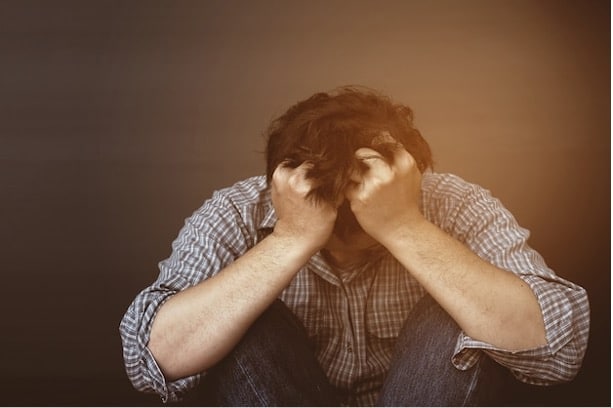Is Depression a concern for you or a loved one?

Depression is rampant in today’s world and skills for coping with depression are critical. According to the World Health Organization (WHO), it is estimated that 5.0% of adults suffer from depression, with more women suffering from this condition than men. Depression affects adults as well as children and teenagers. For someone coping with depression, engaging in daily activities becomes very difficult and life becomes dull. Severe cases can lead to suicidal thoughts.
Our mental health requires proper attention to prevent depression and mental illness. This article will provide more insights on how to cope with depression and how you can handle your moods. Before we get into that, let’s examine mental illness and depression.
What Exactly Is Mental Illness?
Mental illness is a disorder that alters your thought, mood, and behavior. Addictive behaviors, depression, and schizophrenia are all mental illness conditions.
Warning are the Signs of Mental Illness
Mental illness has various symptoms. These symptoms depend on circumstances and other factors and can affect your emotions, thinking process, and how you behave.
Below are some of the warning signs that you’re mentally I’ll;
- Conspicuous change in eating habit
- Suicidal thoughts
- Withdrawal
- Conspicuous tiredness, lack of energy, or insomnia
- Delusions or hallucinations
- Being easily overwhelmed by daily problems or stress
- Marred relationships with people and situations
- Hot temperament, violent attitudes
- Feeling of sadness or being down
- Lack of drive for sex
- Confusion and lack of concentration
- Extreme feelings of fear, worry, guilt
- Drug or alcohol abuse
- Tremendous mood swings
Causes Of Mental Illness
Certain factors, which can also be environmental or genetic, can constitute mental illness; they include:
- Inherited traits
People with a history of mental illness in their family commonly experience mental illness. Certain genes increase risk factors, too, and some life situations can trigger mental illness. - Environmental factors
Environmental factors such as stress, medical conditions, alcohol abuse, and toxins can orchestrate mental illness. - Brain chemistry
Damage to the neural networks of the neurotransmitters can lead to depression and emotional disorders. This results from a change in the function of the nerve receptors and nerve system; neurotransmitters are brain chemicals that dissipate signals around the brain and body.
How To Overcome Mental Illness
Overcoming mental illness involves receiving the proper treatment for your class of mental illness. Listed below are treatments that will help you overcome mental illness.
- Use Of Medications
Medications are not cures but influence symptoms in terms of offering improvement. When medications are combined with some treatments, such as psychotherapy, treatment becomes very effective. How your body responds to medications and your type of mental illness will determine the best medication for you, especially if you are coping with depression. - Psychotherapy
Psychotherapy is another treatment option available to patients with mental illness,and it involves talking to a professional about your condition and other issues. During this treatment, you learn more about your situation, moods, feelings, thoughts, and behavior, aiding you in coping with and managing stress. - Hospital and residential treatment services
Severe mental illness requires the care of a psychiatric hospital, especially when you can’t properly take care of yourself or when you’re in danger of self-harm or harming people around you. - Substance abuse treatment
Most times, substance abuse goes hand-in-hand with mental illness. Substance abuse stalls improvement and accelerates mental illness. If you are addicted to drugs or alcohol, you must seek help and get enlightened by your doctor about treatment options.
What is depression?

Sometimes we feel sad, down, and uninterested in our day-to-day activities. If this persists continuously, depression-related issues could be the cause. Depression is a condition that alters your thoughts, feeling, and actions in a negative manner. This is not the same as the mood fluctuations people regularly experience as part of their everyday life.
Sad events like the loss of a loved one, heartbreak, and job loss can lead to grief, but doctors only consider it as depression when it is persistent. Hence, learning how to cope with depression is one way to cure depressive thoughts. Depression can cause some emotional and physical problems. It can also decrease your productivity in your place of work and at home.
Common Types Of Depression And Their Symptoms
Clinical Depression
Major depressive disorder (MDD) is another name for clinical depression, and this is when one is overwhelmed by a constant cloud of sadness and loses interest in activities they once loved. Such a person could display symptoms that could be intense or acute, lasting for two weeks. These symptoms interfere with everyday life, and they include;
- Difficulty concentrating during activities
- Feeling of worthlessness and guilt
- Changes in weight
- Changes in sleep patterns
- Fatigue
- Loss of interest in activities once enjoyed
- Depression
- Change in appetite
- Sleeping too much
- Anger
- Feeling of sadness
- Loss of interest
- Difficulty falling or staying asleep
- Feeling sad about the past
- Low self-esteem
- Hopelessness
- Fatigue
- Feeling of guilt
- Lack of concentrating
Bipolar Disorder
Bipolar disorder is a mood disorder whereby one goes through an abnormal uprising of the mood called mania. This condition could be mild (hypomania) or extreme enough to cause an infringement in one’s daily life or sense of reality, warranting treatment or care from the hospital. Bipolar disorder usually causes severe depression.Other physical and psychological symptoms arise besides depression and lack of interest. They include:
- Difficulty sleeping
- Low self-esteem
- Anxiety
- High temperament
- Hopelessness
- Tiredness
- Disorganization
- Unexplained aches, pains, and psychomotor agitation
- Indecision
Postpartum Depression (PPD)
“Baby blues” is a condition many women experience after childbirth. Hormone levels resetting after childbirth can cause mood changes. More severe or extreme than this is postpartum depression which can last from months to years.Medical help is required for this type of depression, and there are symptoms associated with it which include:
- Anxiety and panic attacks.
- Changes in appetite
- Extreme mood swings
- Overwhelming feeling of helplessness and hopelessness
- Low mood, feelings of sadness
- Feeling inadequate or worthless
- Social withdrawal
- Suicide thought
- Loss of interest
- Urge for self-harm or harming your baby
- Trouble bonding with the baby
Premenstrual Dysphoric Disorder (PMDD)
Premenstrual dysphoric disorder (PMDD) is a chronic premenstrual disorder (PMS) that affects women days or weeks before their menstrual period.The premenstrual dysphoric disorder has various symptoms, which include:
- Stress or anxiety
- Loss of concentration
- High temperament
- Mood swings, at times with episodes of crying
- Food cravings or binging
- Feeling sad, hopelessness
- Severe fatigue
Major Depressive Disorder With Seasonal Pattern
Previously known as seasonal affective disorder (SAD), this disorder is thought to be caused by a disturbance in the body’s normal circadian rhythm. The light the eyes receives affects this rhythm, and any periodic change in the night/day pattern can lead to an interruption resulting in depression.The symptoms include;
- Weight gain
- Sleepiness
Psychotic depression
Hallucinations and extreme depressive symptoms are two major symptoms associated with this condition. Delusions are deviations from reality, while hallucinations have to do with a connection or interaction with things that are not real. Symptoms of this condition include:
- Hallucinations
- Delusions
Causes Of Depression
To understand what causes this ailment, you must first learn how to cope with depression and move on. What causes depression has eluded understanding in the medical field, but there are some probable causes, with some factors combining to kick-start symptoms of depression
- Environmental factors
Periodic changes in seasons result in major depressive disorder, which is in line with seasonal patterns. - Psychological and social factors
Losing a loved one, lack of care, being isolated, stress, and trauma are all psychological factors that can lead to depression. Bipolar disorder can also set in. - Genetic factors
You might develop this condition if one or more of your family members or relatives have it. - Medical conditions
In addition to continuous pain, some illnesses can lead to depression. Conditions like diabetes, cancer, and Parkinson’s disease usually go hand-in-hand with depression. Also, abnormal changes in the brain’s chemical levels may lead to depression. Some treatments or drugs have side effects, among which is depression. It is not unusual for alcohol and recreational drugs to lead to or aggravate depression. - Personality
If you easily succumb to challenges or have trouble coping, you may be vulnerable to depression.
How To Manage And Treat Symptoms Of Depression

Fortunately, depression can be treated. Handling it can be done through some methods:
- Support
Support ranges from discussing possible causes and giving practical solutions for enlightenment. Support can be initiated by discussing perceived causes and feasible solutions. Educating family members, too, is part of this step.
- Psychotherapy:
Cognitive therapy (CBT) and counseling on a one-to-one basis are some of the various options available in psychotherapy. For some forms of depression, this therapy is usually the first resort, while others require combining it with medication.Psychotherapy as a treatment for depression has two main types; cognitive therapy (CBT) and interpersonal psychotherapy. CBT can be administered over the phone, online, in groups, or individually with a therapist.The role of interpersonal psychotherapy is to assist patients in identifying:- Communication and relationships causing problems
- The correlation between these issues and their mood
- Beneficial changes that could happen
- Exercise
Certain exercises like aerobic exercise could mitigate mild depression. This results from a rise in the endorphin level, which causes stimulation of the neurotransmitter norepinephrine. - Drug treatment
Medical help is advised if you are showing depressive symptoms to know if medication or psychotherapy should be employed. Your doctor may suggest antidepressants for the treatment of moderate-to-severe depression.You should take the medications the exact way the doctor prescribed, but keep in mind that some drugs don’t work immediately but with time. Therefore stopping a prescription due to impatience may prevent its benefits from coming into effect. Some people quit their medication after their symptoms improve; this is not advised as it could cause a relapse. Discuss with your doctor if you have concerns about antidepressants, including the desire to stop taking them. - Brain stimulation therapies
Brain stimulation therapies are among the treatment options for depression. Some, like repetitive transcranial magnetic stimulation, help treat major depression because magnetic pulses are sent to the brain. Electroconvulsive therapy or ECT may be employed if one is not responding to drug treatment, especially if psychosis occurs with depression.
How To Prevent Depression
Some initiatives and activities that can prevent depression in children, adolescents, and adults, are:
- Campaigns and awareness programs
School programs to positively influence the coping patterns of kids and teenagers are one way to combat and prevent depression. Campaigns against drug abuse and other risky lifestyles can help prevent depression.
- Parental Intervention
The involvement and intervention of parents and guardians of young people with known problematic behavioral patterns can help to lessen depressive symptoms and yield positive results for their kids or wards. - Regular Exercise
Exercise programs for people of age can help combat depression.
Understanding the link between depression, anxiety, and mental illness
To establish a connection between these three terms, let’s look at what anxiety is, having explained depression and mental illness before.
Anxiety is a normal feeling that leads to increased fear, alertness, and physical signs like a rapid heartbeat. Anxiety is majorly about a high level of energy.
Anxiety and depression are not the same, although some elements are similar. Depression kick-starts negative emotions such as irritation, low self-esteem, and hopelessness. There is little or no energy, and affected people are often overwhelmed by their daily routines. Personal relationships suffer too.
Depression and anxiety should be treated so as not to hinder your daily activities. Antidepressants are often used to treat both conditions, with behavioral therapy helping greatly.
Generally, anxiety and depression, if they last for long or continue without treatment, can result in mental illness, which is the link between anxiety, depression, and mental illness.
Some Ways To Handle Your Mood
We all have those times when we are not in a good mood and feel down and sad. The question remains, in what ways can you get to the bottom of this mood?
- Keep calm and reflect on how you feel.
- Talk about how you feel to someone.
- Never drink alcohol to change your mood.
- Seek professional help if the need arises.
- Manage your stress properly.
- Find time to relax and sleep well.
- Eat a balanced meal.
- Exercise regularly.
- Do something that makes you happy.
- Join a support group and get active.
Final Thoughts
Anxiety and depression should not be ignored and allowed to persist for too long without getting rid of them because they can lead to mental illness. The totality of your well-being is dependent on your mental health. Therefore, paying attention to your mental health and coping with depression are progressive ways guaranteed to help you to get the best out of life.


